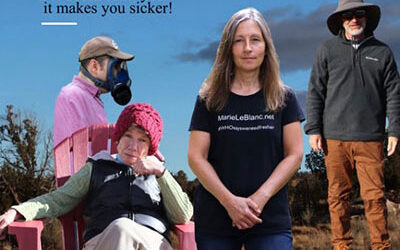 The Mayo Clinic is currently conducting a pilot study of the Gupta Amygdala Retraining™ Programme* for patients with chronic fatigue syndrome (CFS) and fibromyalgia (FMS). The study is by invitation only and only current patients of the Mayo Clinic are being considered. If the pilot study goes well, the Mayo Clinic will be applying for an NIH grant to widen the study to a larger group. The study will be using the same Gupta Amygdala Retraining™ Programme* available for purchase by Ashok Gupta, but will also include regular phone support. The study is 6 months in length, will include an estimated 30 patients, and results will be released in Fall 2010.
The Mayo Clinic is currently conducting a pilot study of the Gupta Amygdala Retraining™ Programme* for patients with chronic fatigue syndrome (CFS) and fibromyalgia (FMS). The study is by invitation only and only current patients of the Mayo Clinic are being considered. If the pilot study goes well, the Mayo Clinic will be applying for an NIH grant to widen the study to a larger group. The study will be using the same Gupta Amygdala Retraining™ Programme* available for purchase by Ashok Gupta, but will also include regular phone support. The study is 6 months in length, will include an estimated 30 patients, and results will be released in Fall 2010.
To be eligible for invitation to the study, you must be a current patient in the Mayo Clinic that treats chronic fatigue syndrome (CFS) and fibromyalgia (FMS). You must also be 18 – 59 years old and meet CDC criteria for Chronic Fatigue Syndrome, have been diagnosed with chronic fatigue, or meet the American College of Rheumatology criteria for fibromyalgia. You must also have access to a DVD player. If you have any of the following conditions, you are excluded from the study: untreated hypo or hyper thyroidism, untreated hypo or hyper parathyroidism, untreated adrenal disorders, untreated diabetes, multiple sclerosis, acute or chronic hepatitis, history of cancer, untreated depression, chronic steroid use, acute inflammatory rheumatological conditions, untreated obstructive sleep apnea, or narcolepsy.
The pilot study description at the clinicaltrials.gov website says that:
The purpose of this pilot study is to gather preliminary data on the efficacy and feasibility of the Amygdala Retraining Program (ARP), a mind-body practice versus a control (C) on fatigue, quality of life and sleep in patients with Chronic Fatigue Syndrome (CFS), Chronic Fatigue (CF) and Fibromyalgia (FM)…Current literature points to a centrally sensitized state in CFS, CF and FM (Meeus 2007). The ARP attempts to retrain this neuronal network through mind-body practices such as cognitive restructuring via neurolinguistic programming, yoga based breathing and simple mindfulness based meditation. A case series of 33 patients with CFS and ARP reported improvement in 92% of patients with two-thirds of patients reaching 80-100% of pre-illness levels of health (Gupta 2009). However ARP has never been formally studied in CFS.
We propose to gather preliminary data on the efficacy and feasibility of ARP versus C on fatigue, quality of life and sleep in 30 patients with CFS, CF and FM. All participants will undergo standard clinical treatment which consist of a 2 day self-management program in the Chronic Fatigue Clinic. Following this, participants will be randomized into the ARP or C group. The ARP group will receive an additional 2.5 hour training surrounding core concepts of the ARP program. They will then be given the ARP DVD program and booklet, to reinforce and continue the practice. They will then receive scheduled bi-monthly phone calls for 3 months from a study investigator for support. The C group will receive only standard care. However they will receive a complementary copy of the ARP program at the end of the study (6 month time point) as a gift for participation in the study.
Preliminary data on efficacy will be assessed at baseline, 1, 3 and 6 months using the following validated questionnaires: Multidimensional Fatigue Inventory (MDFI), Short form-36 (SF36) Fibromyalgia Impact Questionnaire (FIQ), Epworth Sleep Scale (ESS) and Measure Your Medical Outcome Profile (MYMOP-2). Feasibility will be assessed by evaluation of a daily practice log where patients record the total time spent daily in the practice of ARP and any specific difficulties they encountered in the practice of the program.”
For more information on the study, call the Mayo Clinic at (507) 255-1277.
*As of January 25, 2010, Planet Thrive is participating in an affiliate program for the Gupta Amygdala Retraining™ Programme after observing over 30 members of the Planet Thrive Gupta Support Group, who reported many benefits over several months time.









I am interested. I would qualify. I have fibromyalgia and am 55 years old. Anything that can affect this process is exciting. Please keep me in mind for the study.
Hi Renee,
If you are interested in participating in the study, you will need to contact the Mayo Clinic using the contact info above. We are not connected with the study at all; we are just sharing it with our readers. Good luck to you! Julie
Thanks Julie! This really is exciting news and will look forward to any reports you post in the future.
Hi, I am 21 years old female from New Zealand. A friend sent me info about the Gupta programme and I am highly interested but it is alot of money. Do you know how th people are going so far? Any improvement and when do you think th results will be available. I am trying the old affirmations idea as I am sure that is a way he is retraining the mind, it has already helped me. I would love to hear any news you have on this programme.
Thank you so much
Mayo Clinic Gupta training reaserch had: a „statistically significant improvements in scores for physical health, energy, pain, symptom distress, and fatigue in patients who received the amygdala retraining compared with standard care.“ https://www.ncbi.nlm.nih.gov/pubmed/22385563?dopt=Abstract
21 compleated Gupta Training (with 23 controll group); 2.5 hours Teaching, home DVDs and phone calls every 4 days. https://www.ncbi.nlm.nih.gov/pubmed/22385563?dopt=Abstract
A) general health questionnaire (self-report), Medical Outcome (measure yourself), well-being, and symptoms.
B) ‘Form-36’ (mayo), Sleep-Scale (epthworth), Fatigue Inventory, FM Impact Questionnaire.
„statistically significant improvements in scores for physical health, energy, pain, symptom distress, and fatigue in patients who received the amygdala retraining compared with standard care.“